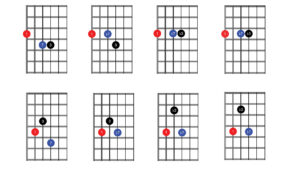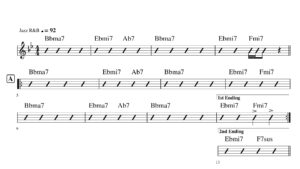
Comping with Shell Voicings
If you’re playing in a situation where there are lots of 7th chords, and there’s a bass player, it’s good to learn shell voicings.
Special for New Monthly Memberships – First 2 Months for $29. Through June 30, 2025.
Welcome to the Fret Blog by Fretboard Biology. The Fret Blog provides tips for guitar players on a variety of topics like playing rhythm guitar, lead guitar, music theory, how to practice, how to make the stage a comfortable place and much more.
Feel free to share with all your guitar playing friends!

If you’re playing in a situation where there are lots of 7th chords, and there’s a bass player, it’s good to learn shell voicings.

If you perform live in a band, you’ve experienced the challenges of keeping everyone moving in the same direction.

If you can be the person who is always ready for the rehearsal and the gig, your stock will go up and you’ll get hired back.

Guitar players generally start with a chord progression or riff that serves as the catalyst for the rest of the song.

Some guitar players love the sound and feel of brand new strings while others love the sound and feel of older strings.

Most guitar players probably spend 95% of their time practicing soloing and 5% of their time practicing rhythm guitar. But on the gig, it’s the opposite.

Some of us are born with long and coordinated fingers, some with long and slow fingers. Some of us have shorter fingers that can fly, and some with fingers that just don’t want to move.

I incorporate methods into my guitar practice routine to mimic the physical and mental experience of playing a live show.

Imagine you have to learn 20 to play songs in 2 days. A good way to memorize a song quickly is to think of it as an outline.

The key to harnessing your excitement is to make the stage your natural habitat through experience on stage and great preparation.

As you practice guitar or work through a program like Fretboard Biology, it’s important to measure your progress. Improvement rarely comes in big spurts. It comes over time, after a lot of practice.

Always remember to write music chord charts from the perspective of the musician who will have to read it in the heat of battle.